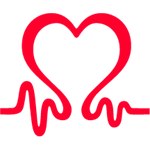This October is National Cholesterol Month and to raise awareness, we’ve teamed up with the British Heart Foundation to share some more information about high cholesterol, advice on getting your cholesterol checked and how to keep a healthy cholesterol level.
What is high cholesterol?
Cholesterol is a fatty substance found in your blood. Although we all need some cholesterol in our bodies, having high cholesterol or too much can increase your risk of heart and circulatory diseases such as heart attack and stroke.
What causes high cholesterol?
Anyone can get high cholesterol as it can be caused by many different things. Some things you can control like lifestyle habits, others you can’t.
Things that cause high cholesterol you can control:
- eating too much saturated fat
- not being active enough
- Smoking
Things that cause high cholesterol you can't control:
- getting older
- ethnic background
- Familial Hypercholesterolaemia (FH), an inherited form of high cholesterol.
- kidney or liver disease
- an underactive thyroid gland
What are the symptoms of high cholesterol?
There aren't any typical signs that you have high cholesterol which is why you may not know you have it, therefore it is important to get it checked out. It's a hidden risk factor which means it can happen without us knowing until it's too late.
You can find out more about getting tested for high cholesterol here>

How do I lower my cholesterol?
Keeping on top of the things you can control with simple changes can help to lower your risk of heart and circulatory disease. The British Heart Foundation answer the most popular questions below:
- What foods will make my high cholesterol worse?
If you have high cholesterol, it’s most important to eat less saturated fat. Foods that are high in saturated fats are things like fatty and processed meat, pies and pastry, butter, cream, and coconut oil.
- What changes to my diet will help lower my cholesterol?
As Part of a healthy balanced diet, swapping foods high in saturated fats for foods that are high in unsaturated fat can help to lower cholesterol levels.
Try:
- swapping butter to vegetable oil spreads like sunflower, olive or rapeseed oil spreads
- switching whole milk to semi skimmed or skimmed milk
- using natural yogurt instead of sour cream or double cream
- replacing regular mince with extra lean 5% fat beef mince or 2% turkey mince.
- swapping red or processed meat for fish, turkey or chicken without the skin, or plant-based proteins such as lentils, soya or Quorn
- switch your crisps for unsalted nuts
- having reduced fat cheese instead of regular cheese
- Can exercise help lower cholesterol?
Yes it can. Getting your blood pumping by doing exercise will reduce your cholesterol. Being active helps your body move the bad cholesterol to your liver where it can be removed out of your system.
You could try:
- taking the stairs instead of the lift
- a brisk walk instead of a slow walk
- a cycle ride
- yoga or pilates if you can’t get out
- Will stopping smoking lower my cholesterol?
If you're a smoker you might already know you should stop if you have high cholesterol. Smoking increases ‘bad cholesterol’ and lowers ‘good cholesterol’
You can find tips and advice to help stop smoking here >
Our sister service, Chemist Direct, has a wide range of aids to help you manage cravings and help increase your chances of successfully quitting here >
- Should I stop drinking if I have high cholesterol?
Cutting down on alcohol will help your liver to work better at removing bad cholesterol. It may also improve your heart health in other ways by helping you lose weight and lower your blood pressure.
Our top tips for drinking less alcohol are to:
- drink less than 14 units of alcohol a week equivalent to roughly 6 pints of beer or 10 125ml glasses of low strength wine.
- have a few days each week where you don’t drink at all
- order a small glass of wine or half a pint of beer.
Further information
For more information and support about high cholesterol, talk to your GP or pharmacist. You can also find out more below:
https://www.bhf.org.uk/informationsupport/risk-factors/high-cholesterol
